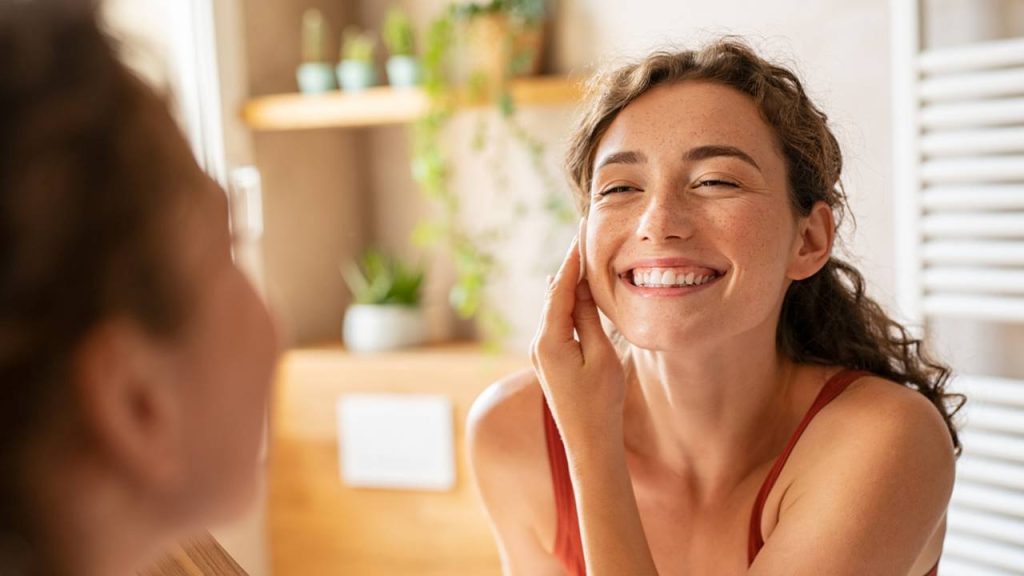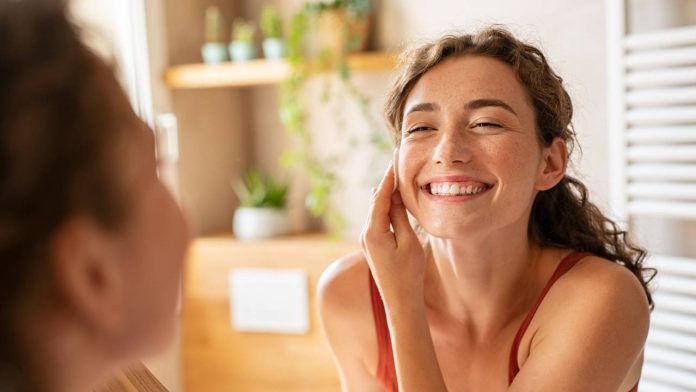Inappropriate habits, pollution and other external agents can cause premature aging of the skin. It can be avoided with proper care.

- Why skin ages
- Main symptoms of skin aging
- Causes of premature aging of the skin
- How to prevent premature aging
- Food to keep skin young
Something that can concern us all at some point in life is aging. We can accept it more or less naturally, but what we would certainly want to avoid is that it arrives early and makes us look and feel older than we are. Premature aging manifests itself especially in the skin, but it can be avoided by knowing the factors that accelerate the degenerative process and lifestyle measures that favor good looks and health for many years.
WHY SKIN AGES
The passage of time brings with it a series of changes, both structural and functional, in all organs and, among them, the skin. To understand the diversity in the manifestations of skin aging, we must first remember that the skin has three layers. From the outside in, these layers are:
- The epidermis is the layer we can touch, it is our “barrier” of protection against germs, ultraviolet radiation, harmful chemicals and trauma. It also prevents water loss, dehydration.
- The dermis is the intermediate layer that gives a firm and smooth consistency to the skin. It is like a mattress with springs, made of collagen and elastin fibers, which provide strength and elasticity, and with a filling formed mainly by hyaluronic acid, which attracts water to maintain hydration.
- The hypodermis is the deepest layer and is formed by subcutaneous fat, which cushions shocks, isolates from cold and heat, and also serves as an energy reserve for the body.
Now we can understand how skin aging affects these three layers of the skin and produces the effects we fear so much: wrinkles, sagging, spots and dehydration.
MAIN SYMPTOMS OF SKIN AGING
When the epidermis thins due to less cell turnover and a reduction in fat production, and also receives less oxygen from the underlying layer, it becomes rougher, dries, loses shine and becomes more sensitive to solar radiation, with an increased risk of spots.
It is also less efficient at healing wounds. The dermis thins by breaking down and disorganizing its collagen and elastin fibers, and by reducing hyaluronic acid. This manifests itself in the form of wrinkles, less elasticity and greater ease of rupture of blood capillaries with the appearance of vascular spiders (telangiectasias) and hematomas.
The subcutaneous adiposity layer also loses volume, which is appreciated, for example, in the sinking of the cheeks and the formation of deep wrinkles.
In most cases, the first signs of skin aging begin around age 25, intensify with each decade, and deepen with the hormonal change that occurs after menopause.
CAUSES OF PREMATURE AGING OF THE SKIN
This natural process depends, in part, on genetics (which determines some skin characteristics) and age. But the external factors that are part of our lifestyle are more relevant:
- Radiation, mainly ultraviolet solar radiation (UVR), but also blue light from mobile and computer screens. Yes, this type of light is capable of penetrating the skin and causing oxidative stress.
- Pollution, especially smoke from cars and factories.
- Alcohol, tobacco and other drugs, due to their pro-oxidant chemical compounds.
- Extreme temperatures, both hot and cold
- Improper nutrition, rich in ultra-processed and poor in antioxidants, which are found mostly in vegetables.
- Stress, both psychological and physical.
- Lack of restful sleep, with difficulty falling or staying asleep.
- Chronic diseases (overweight and obesity, diabetes, hypertension, etc.) and chronic low-grade inflammation.
All these factors contribute to a process known as oxidative stress, which produces the release of molecules called free radicals, capable of causing damage to various components of the cell, including its lipids and proteins, such as collagen and elastin.
HOW TO PREVENT PREMATURE AGING
Up to 75 percent of skin aging is caused by extrinsic environmental, not genetic, factors that we can control. Therefore, we have a wide margin to improve our habits so that they contribute to the conservation of healthy and attractive skin.
It is not only an aesthetic issue, taking care of the skin in a natural and integral way is pampering the body as a whole. The beneficial effects of healthy habits are reflected in the skin, but they reach the last cell of the body.
We can intervene in those factors that depend on us and are within our reach day by day.
FOOD TO KEEP SKIN YOUNG
Eating a balanced diet, free of ultra-processed foods and based on the intake of abundant plant antioxidants that neutralize the effect of free radicals is essential.
This antioxidant effect is possessed by beta-carotene (which is transformed into vitamin A), vitamins C and E, zinc, selenium, lutein and lycopene. Dozens of plant compounds, such as omega-3 fatty acids, polyphenols and flavonoids, such as resveratrol, a compound found in the skin of black grapes, reduce the harmful effect of solar radiation, increase skin elasticity and reduce wrinkles, are also antioxidants and anti-inflammatories. The following foods contain all of these compounds:
- Fruits and vegetables of different colors: The richest in antioxidants are blueberry, strawberry, açaí, cherry, raspberry, blackberry, currant, goji berry, grape, orange, mango, papaya, watermelon, kiwi, pomegranate, melon, apricot, red pepper, tomato, cabbage, spinach, broccoli, pumpkin, carrots, sweet potato, zucchini, artichoke, beets, garlic, onion and leek.
- Nuts: Walnut, almond, pistachio, macadamia, hazelnut, cashew and pine nut.
- Seeds: Chia, sesame, flax, sunflower and hemp.
- Vegetables: Especially red and black beans
- Oils: Extra virgin olive oil and flax oil.
- Infusions and drinks: green tea, red tea, kombucha tea.
- Spices: Cinnamon, turmeric, cayenne and pure cocoa.
AVOID EXTERNAL AGGRESSIONS AND RISK FACTORS
- Completely avoid tobacco, which directly damages the skin and increases that caused by the sun.
- Protect yourself from solar radiation by creams with protection factor 50+ in summer and 30+ in winter, covering a wide spectrum of radiation: UVA, UVB, IR (infrared) and HEVL (visible light). It is advisable to choose a product with natural or ecological certification. Remember to renew it every two hours and after getting out of the water. Also, wear clothes that cover your skin, hat and sunglasses. And, whenever you can, choose the shade. A Polypodium leucotomies supplement of 360 mg daily can reduce skin inflammation and increase protection against solar radiation.
- Protect yourself from blue light, limiting the time spent in front of screens. Use apps that provide blue light filters and remember that there are photoprotective creams that filter visible light, including blue light (they carry the acronym HEVL on their packaging).
- Avoid environmental dryness caused by excessive heating or air conditioning. If the humidity drops below 50%, make sure you have a humidifier.
- Control stress with tools such as mindfulness, tai chi, chikung, yoga, dance, etc.
- Sleep uninterrupted and deeply. Remember that all your cells, including those in your skin, are renewed at night.
- Choose natural and gentle cosmetics, and avoid the use of soaps, alcohols, abrasives or exfoliants that damage the skin barrier.
- Have check-ups with your family doctor to prevent pathologies or treat them in time, and with your dermatologist to detect any malignant lesion that may appear early.
NATURAL DAILY ROUTINE TO REJUVENATE THE SKIN
The goal of the routine is to protect yourself from pollution, radiation and other oxidizing factors that you will encounter during the day when you leave home. In addition, it will provide the skin with the necessary elements to regenerate.
- In the morning: As at night the skin expels impurities, it is advisable to start by cleaning it with milk or micellar water. Choose the certified natural or organic product that best suits your skin type. Then, apply a cream containing antioxidant ingredients such as coenzyme Q10, vitamin E, vitamin C, pomegranate extract, green tea extract, resveratrol, etc.
- During the day: Drink plenty of water and green tea infusions. Eat fruits and vegetables of different colors. When you get home, remove makeup, dirt and dead cells with cleansing milk or micellar water.
- At night: Apply a repairing and moisturizing cream with hyaluronic acid, retinol, peptides, growth factors and alpha hydroxy acids (these should be avoided in summer). Then, use a serum or cream with antioxidants again. Give yourself small taps and a gentle massage before bed. In addition, you can set the bedroom with essential oils of lavender, bergamot or chamomile.

